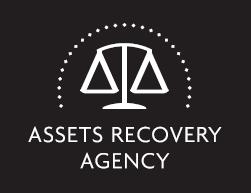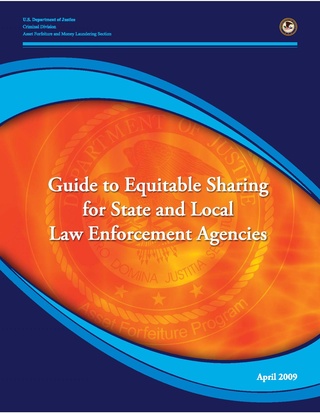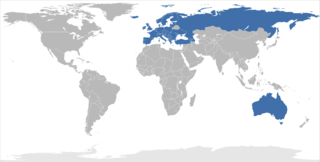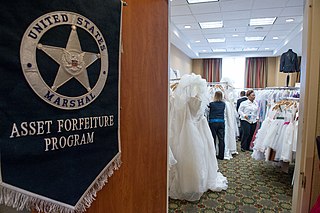Related Research Articles
A search warrant is a court order that a magistrate or judge issues to authorize law enforcement officers to conduct a search of a person, location, or vehicle for evidence of a crime and to confiscate any evidence they find. In most countries, a search warrant cannot be issued in aid of civil process.

The Assets Recovery Agency (ARA) was a non-ministerial government department in the United Kingdom. It was established under the Proceeds of Crime Act 2002 (POCA) to reduce crime by confiscating the proceeds of any crime. It was granted a new power of civil recovery through the High Court, and could also take over the powers of the HM Revenue and Customs (HMRC) to levy tax without identifying a source for taxed income.

The Criminal Assets Bureau (CAB) is a law enforcement agency in Ireland. The CAB was established with powers to focus on the illegally acquired assets of criminals involved in serious crime. The aims of the CAB are to identify the criminally acquired assets of persons and to take the appropriate action to deny such people these assets. This action is taken particularly through the application of the Proceeds of Crime Act 1996. The CAB was established as a body corporate with perpetual succession in 1996 and is founded on the multi-agency concept, drawing together law enforcement officers, tax officials, social welfare officials as well as other specialist officers including legal officers, forensic analysts and financial analysts. This multi-agency concept is regarded by some as the model for other European jurisdictions.
An amercement is a financial penalty in English law, common during the Middle Ages, imposed either by the court or by peers. The noun "amercement" lately derives from the verb to amerce, thus: the king amerces his subject, who offended some law. The term is of Anglo-Norman origin, and literally means "being at the mercy of": a-merce-ment.

The Proceeds of Crime Act 2002 (POCA) is an act of the Parliament of the United Kingdom which provides for the confiscation or civil recovery of the proceeds from crime and contains the principal money laundering legislation in the UK.
The USA PATRIOT Act was passed by the United States Congress in 2001 as a response to the September 11, 2001 attacks. It has ten titles, each containing numerous sections. Title III: International Money Laundering Abatement and Financial Anti-Terrorism Act of 2001 is actually an act of Congress in its own right as well as being a title of the USA PATRIOT Act, and is intended to facilitate the prevention, detection and prosecution of international money laundering and the financing of terrorism. The title's sections primarily amend portions of the Money Laundering Control Act of 1986 and the Bank Secrecy Act of 1970.

Asset forfeiture or asset seizure is a form of confiscation of assets by the authorities. In the United States, it is a type of criminal-justice financial obligation. It typically applies to the alleged proceeds or instruments of crime. This applies, but is not limited, to terrorist activities, drug-related crimes, and other criminal and even civil offenses. Some jurisdictions specifically use the term "confiscation" instead of forfeiture. The alleged purpose of asset forfeiture is to disrupt criminal activity by confiscating assets that potentially could have been beneficial to the individual or organization. Asset forfeiture was found to generally increase with the percentage of the assets retained depending on electoral incentives.

The Fifth Amendment to the United States Constitution creates several constitutional rights, limiting governmental powers focusing on criminal procedures. It was ratified, along with nine other amendments, in 1791 as part of the Bill of Rights.

The Serious Crime Act 2007 is an Act of the Parliament of the United Kingdom that makes several radical changes to English criminal law. In particular, it creates a new scheme of serious crime prevention orders to frustrate crime in England and Wales and in Northern Ireland, replaces the common law crime of incitement with a statutory offence of encouraging or assisting crime, makes provision as to disclosure and information sharing in order to prevent fraud, and abolishes the Assets Recovery Agency creating a new regime for the recovery of the proceeds of crime.
Nuisance abatement is a growing area within policing and code enforcement. The term refers to using building codes, fire codes, zoning, etc. in order to improve the quality of life and resolve life safety issues within neighborhoods. Nuisance abatement programs are most often a component of problem oriented or community policing programs. In most Canadian jurisdictions, bylaw enforcement officers handle nuisance abatement.
Prevention of Money Laundering Act, 2002 is an Act of the Parliament of India enacted by the Indian Government to prevent money laundering and to provide for confiscation of property derived from money laundering. PMLA and the Rules notified thereunder came into force with effect from 1 July 2005. The Act and Rules notified thereunder impose obligation on banking companies, financial institutions and intermediaries to verify the identity of clients, maintain records and furnish information in prescribed form to Financial Intelligence Unit – India (FIU-IND).

International asset recovery is any effort by governments to repatriate the proceeds of corruption hidden in foreign jurisdictions. Such assets may include monies in bank accounts, real estate, vehicles, arts and artifacts, and precious metals. As defined under the United Nations Convention against Corruption, asset recovery refers to recovering the proceeds of corruption, rather than broader terms such as asset confiscation or asset forfeiture which refer to recovering the proceeds or instrumentalities of crime in general.

Equitable sharing refers to a United States program in which the proceeds of liquidated seized assets from asset forfeiture are shared between state and federal law enforcement authorities. The Comprehensive Crime Control Act of 1984 set up the arrangement in which state and local police can share the seizures with federal agents. The law allows state and local law enforcement to retain up to 80% of the proceeds from seizures made in collaboration with federal agencies and from seized assets turned over to the federal government that the federal government then elects to adopt.

The Convention on Laundering, Search, Seizure and Confiscation of the Proceeds from Crime, also known as the Strasbourg Convention or CETS 141, is a Council of Europe convention which aims to facilitate international co-operation and mutual assistance in investigating crime and tracking down, seizing and confiscating the proceeds thereof. The Convention is intended to assist States in attaining a similar degree of efficiency even in the absence of full legislative harmony.

In the United States, civil forfeiture is a process in which law enforcement officers take assets from people who are suspected of involvement with crime or illegal activity without necessarily charging the owners with wrongdoing. While civil procedure, as opposed to criminal procedure, generally involves a dispute between two private citizens, civil forfeiture involves a dispute between law enforcement and property such as a pile of cash or a house or a boat, such that the thing is suspected of being involved in a crime. To get back the seized property, owners must prove it was not involved in criminal activity. Sometimes it can mean a threat to seize property as well as the act of seizure itself. Civil forfeiture is not considered to be an example of a criminal justice financial obligation.

A police auction is an auction of goods which have been confiscated by the police and cannot or may not be returned to their original owners. They may also contain surplus and retired police equipment, such as used police cars.

A government auction or a public auction is an auction held on behalf of a government in which the property to be auctioned is either property owned by the government or property which is sold under the authority of a court of law or a government agency with similar authority.

The European (EU) Union Asset Recovery Offices (ARO) are national central contact points that facilitate EU-wide tracing of assets derived from crime.
Nebraska v. One 1970 2-Door Sedan Rambler (Gremlin) 191 Neb. 462, 215 N.W.2d 849 (1974) is a Nebraska Supreme Court civil forfeiture case. It was brought by the American state of Nebraska to seize a Rambler Gremlin on the sole grounds it was transporting illegal marijuana. The owner appealed against the forfeiture decision on the grounds of a claimed lack of due process. The court ruled 4–2 and sustained the confiscation as lawful.
Task Force KleptoCapture is a United States Department of Justice unit established in March 2022 with the goal of enforcing sanctions on Russian oligarchs in response to the Russian invasion of Ukraine.
References
- 1 2 3 4 5 One or more of the preceding sentences incorporates text from a publication now in the public domain : Chisholm, Hugh, ed. (1911). "Confiscation". Encyclopædia Britannica . Vol. 6 (11th ed.). Cambridge University Press. p. 907.
- ↑ "Anna Here, But Without Her Harp".
- ↑ Alexander, John K. (2004-01-13). Samuel Adams: America's Revolutionary Politician. Rowman & Littlefield Publishers. p. 56. ISBN 9781461642787.
- ↑ Leamon, James S. (March 1995). Revolution Downeast: The War for American Independence in Maine. Univ of Massachusetts Press. ISBN 0870239597.
- ↑ Laura Sullivan (November 10, 2014). "Police Can Seize And Sell Assets Even When The Owner Broke No Law". NPR.